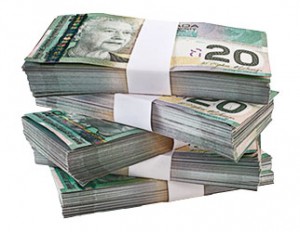Cash: King for the timid, trash for the wealthy?
In the real world, we never buy something with a share certificate, a brick or a gold bar. So how is it possible that cash is often viewed as trash?
Advertisement
In the real world, we never buy something with a share certificate, a brick or a gold bar. So how is it possible that cash is often viewed as trash?
 One of the problems with historically low interest rates is it reinforces the idea that cash is “trash,” a worthless asset destined to lose ground to inflation. That’s a pity, considering that cash is a major asset class, behind only stocks, bonds and perhaps real estate.
Cash is special, if only because it’s always useful for purchasing any of these other asset classes. That’s why deep-value investors always like to set aside a chunk of their portfolios in cash so they can snap up bargain-priced stocks during panic sell-offs. This is what they call “keeping your powder dry.”
In a sense, cash is like an investor’s oxygen. It’s everywhere and we must breathe it to survive. How do we assess the value of a business or stock? Largely by how much cash (or dividends) it throws off. Real estate? By the amount of rental income it generates, which is just another form of cash. Longer-term bonds? By the coupon or interest paid out, which in the end is yet another variant of cash.
It’s an obvious point but in the real world, we never buy something with a share certificate, a brick or a gold bar. We put up cold hard cash or its electronic equivalent via a debit card or credit card.
One of the problems with historically low interest rates is it reinforces the idea that cash is “trash,” a worthless asset destined to lose ground to inflation. That’s a pity, considering that cash is a major asset class, behind only stocks, bonds and perhaps real estate.
Cash is special, if only because it’s always useful for purchasing any of these other asset classes. That’s why deep-value investors always like to set aside a chunk of their portfolios in cash so they can snap up bargain-priced stocks during panic sell-offs. This is what they call “keeping your powder dry.”
In a sense, cash is like an investor’s oxygen. It’s everywhere and we must breathe it to survive. How do we assess the value of a business or stock? Largely by how much cash (or dividends) it throws off. Real estate? By the amount of rental income it generates, which is just another form of cash. Longer-term bonds? By the coupon or interest paid out, which in the end is yet another variant of cash.
It’s an obvious point but in the real world, we never buy something with a share certificate, a brick or a gold bar. We put up cold hard cash or its electronic equivalent via a debit card or credit card.
Share this article Share on Facebook Share on Twitter Share on Linkedin Share on Reddit Share on Email